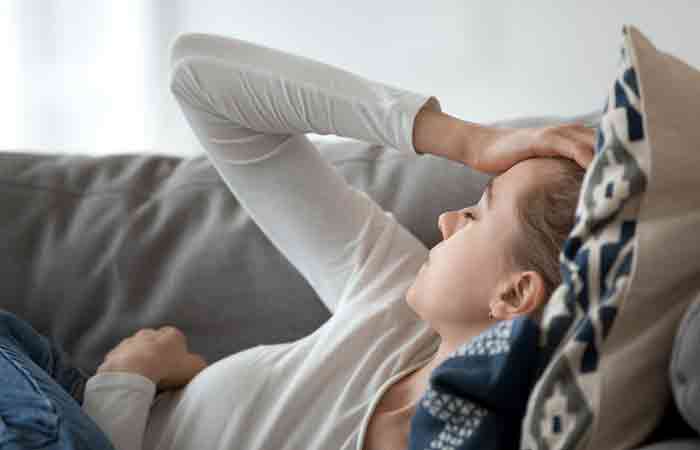She Added This into Her SHAMPOO and Forgot About Hair Loss FOREVER! She Now Recommends Her Trick To

You may include the following foods in your diet :
- Sunflower seeds
- Vegetable oils (safflower, wheat germ, sunflower, and corn oil)
- Nuts, such as peanuts and almonds
- Peanut butter
- Green leafy vegetables, such as broccoli and spinach
- Avocados
- Kiwis
- Mango
- Breakfast cereals and fruit juices fortified with vitamin E
Try to increase your vitamin E intake by including at least one or more of these foods in your diet. To ensure that you are getting the required amount of Vitamin E each day, check the recommended dietary allowance below.
Daily Recommended Intake Of Vitamin E
The National Institutes of Health recommends the following dosage :
| Age | Male | Female | Pregnancy | Lactation |
| 0-6 months | 4 mg | 4 mg | ||
| 7-12 months | 5 mg | 5 mg | ||
| 1-3 years | 6 mg | 6 mg | ||
| 4- 8years | 7 mg | 7 mg | ||
| 9-13 years | 11 mg | 11 mg | ||
| 14 years and above | 15 mg | 15 mg | 15 mg | 19 mg |
Excessive levels of vitamin E in your body can cause serious health risks. Also, vitamin E supplements can interact with other drugs. Check out its side effects below, including the side effects of vitamin E capsules for hair before them.
Vitamin E: Risks, Side Effects, And Interactions

Taking more than the recommended daily value of vitamin E may increase your risk of:
- Hemorrhagic strokei
- Nausea
- Fatigue
- Weakness
- Intestinal cramps
- Headaches
- Diarrhea and flatulence
- Blurred vision
- High creatinine in the urine
Apart from this, vitamin E is also found to interact or interfere with certain medications:
- Anticoagulant And Antiplatelet Medicines: May increase the risk of bleeding.
- Chemotherapy Or Radiation Drugs: May affect the efficacy of the treatment.
- Simvastatin And Niacin: May interfere with the cardioprotective effects of the drugs.
The risks are only associated with the excessive intake of vitamin E supplements. Vitamin E from food sources does not cause any such side effects.
 Quick Tip
Quick TipInfographic: Benefits Of Vitamin E Oil For Hair
Vitamin E oil is great for all hair types. If you’re still wondering if vitamin E is good for hair, yes it is. It is beneficial to those who are experiencing hair loss and hair thinning. It promotes hair growth and adds shine to your tresses. However, people with certain conditions should avoid using this oil. Do a patch test before using it on your hair to avoid its side effects. Click on the infographic below to learn about the benefits of vitamin E oil for hair and who should avoid using it.
Research is limited regarding the beneficial effects of vitamin E for hair. However, this potent antioxidant can help to maintain your overall hair health. While you may use topical vitamin E products to maintain your scalp health, oral vitamin E supplements may help to nourish the scalp and hair from within. However, excess intake of vitamin E supplements may cause unwanted side effects. Therefore, before taking any supplements, consult a doctor to determine if you need to take them and the correct dosage.
Frequently Asked Questions
Can vitamin E oil be applied directly on hair?
No, as it may cause an allergic reaction. Dilute it with any carrier oil or your regular hair oil before applying.
How often should you apply vitamin E to your hair?
You may use vitamin E-rich hair masks, shampoos, and conditioners 2-3 times a week.
Can I leave vitamin E on my hair overnight?
Yes, you may. However, ensure that it is diluted with hair oil, and you wash it off thoroughly the next morning.
Can vitamin E be mixed with coconut oil?
Yes, you may mix vitamin E and coconut oil.
Which oil is high in vitamin E?
Wheat germ oil has the highest percentage of vitamin E.
What is the best time to take vitamin E supplements?
Consult a doctor to know the right time for taking supplements.
Can vitamin E cure dandruff?
No. It cannot cure dandruff.
Can I leave vitamin E on my hair for 2 days?
There is currently no evidence that suggests that leaving vitamin E on your hair for 2 days is unsafe. However, it is mostly recommended that you leave the vitamin E on your hair overnight and rinse it out the next morning.
How many times can we a vitamin E capsule for hair?
You can mix vitamin E capsules with jojoba or coconut oil and apply the mixture to your scalp twice or thrice a week to improve your hair health.
Does excess vitamin E cause hair loss?
Yes, studies have linked the excess use of vitamin E capsules to hair loss (6). Consult your doctor for the correct dosage before usage.
Key Takeaways
- Vitamin E prevents hair loss and promotes hair growth.
- Consuming vitamin E supplements is the best way to provide vitamin E to your body.
- However, vitamin E can cause intestinal cramps, nausea, weakness, and blurred vision if consumed more than required.
Learn how to use vitamin E oil for your scalp to nourish and protect your hair. Watch the video to know how to apply it and get the best results.
References:
- Effects of Tocotrienol Supplementation on Hair Growth in Human Volunteers
https://www.ncbi.nlm.nih.gov/pmc/articles/PMC3819075/ - Antioxidants and lipid peroxidation status in the blood of patients with alopecia
https://pubmed.ncbi.nlm.nih.gov/10965354/ - Oxidative Stress in Ageing of Hair
https://www.ncbi.nlm.nih.gov/pmc/articles/PMC2929555/ - Exogenous antioxidantsDouble-edged swords in cellular redox state
https://www.ncbi.nlm.nih.gov/pmc/articles/PMC2952083/ - Vitamin E
https://ods.od.nih.gov/factsheets/VitaminE-HealthProfessional/ - Diet and hair loss: effects of nutrient deficiency and supplement use.
https://www.ncbi.nlm.nih.gov/pmc/articles/PMC5315033/






